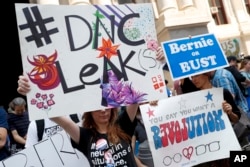Federal authorities are investigating the possibility that hackers have breached the computer network of presidential candidate Hillary Clinton, as part of a larger cyberattack on the U.S. Democratic Party.
Law enforcement officials told U.S. media outlets that the Federal Bureau of Investigation and the Department of Justice were involved in the investigation.
Neither agency has confirmed the probe.
"The FBI is aware of media reporting on cyber intrusions involving multiple political entities, and is working to determine the accuracy, nature and scope of these matters. The cyber threat environment continues to evolve as cyber actors target all sectors and their data," the agency wrote to VOA.
Clinton campaign officials responded late Friday, saying one of their databases has been compromised, but that analytics program was maintained by the Democratic National Committee (DNC), which already is known to have been hacked. A Clinton spokesman, Nick Merrill, said security experts have found no evidence that internal campaign systems have been hacked.
Friday's disclosure of an investigation of possible computer intrusions targeting the Clinton campaign follows penetrations of DNC and the party's fundraising committee for its elected members of Congress, the Democratic Congressional Campaign Committee (DCCC).
Democratic Party officials have pointed to Russian involvement in both of those computer penetrations, heightening unconfirmed allegations that Moscow is trying to influence the U.S. presidential election in favor of Republican candidate Donald Trump.
View from Russia
Earlier, Clinton had said she considered the hacking to be a national security issue.
Trump has sought to distance himself from the purported Russian connection to the hacking at Democratic offices and Moscow's supposed support for his candidacy.
"It is so farfetched," he said Thursday. "It’s so ridiculous. Honestly I wish I had that power. I’d love to have that power, but Russia has no respect for our country."
In Moscow on Thursday, observers also played down the connection between Trump and the Kremlin.
Maria Lipman, editor-in-chief of Counterpoint, a Moscow-based journal published by George Washington University, said the idea that there was “direct contact" between the U.S. Republican candidate and the Russian leadership “is something from the realm of fantasy.”
“Despite the whole story of the leak of emails, the participation of Russian hackers, which seems to be considered already proven, I believe Russia's ability to influence the outcome of the elections and, in general, the existence of ties between Trump and the Russian leadership are very greatly exaggerated,” she told VOA’s Russian service.
The Russian leadership, she added, does not see the possibility of a Clinton victory next November as a “catastrophe.”
Valery Garbuzov, director of the Russian Academy of Sciences’ Institute for the U.S. and Canadian Studies in Moscow, said there is no guarantee Trump’s current praise of the Russian government would continue if he won the election in November.
“Everyone understands that what is said in an election campaign is not always repeated in the White House,” Garbuzov told VOA. “I think the Russian leadership needs to remember that Trump, having landed in the White House, may speak very differently. No one in Moscow is even discussing the issue of how, if Trump ends up in the White House, will the formation of his team go. Won’t his accession to the throne simply lead to chaos in the system of governmental leadership?”
Russia's 'troubling past'
The DCCC said Friday that it had hired CrowdStrike, a cybersecurity firm, to investigate.
"We have taken and are continuing to take steps to enhance the security of our network," the committee said in a statement. "We are cooperating with federal law enforcement with respect to their ongoing investigation."
When asked Friday whether the attacks on the DNC and the DCCC were connected, White House spokesman Eric Schultz said there was a usual list of suspects and that the FBI was looking into them. "Russia has a troubling past on cyberattacks," he added.
Last week, WikiLeaks released 20,000 DNC emails it said were given to it by an anonymous hacker, just before the start of the Democrats' national convention that got underway Monday in Philadelphia.
The 20,000 emails, some of which featured DNC officials disparaging presidential candidate Vermont Senator Bernie Sanders, enraged many of his supporters, who had claimed the party was tipping the scales in favor of Clinton.
As a result, the DNC chairwoman, Representative Debbie Wasserman Schultz of Florida, announced her resignation this week.
VOA Russian service reporter Danila Galperovich in Moscow and national security correspondent Jeff Seldin in Washington contributed to this report..






